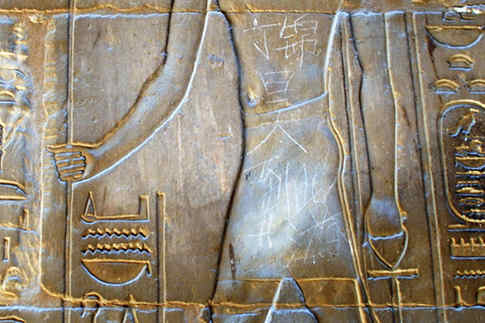“丁錦昊到此一游”事件持續(xù)發(fā)酵,并引發(fā)熱烈討論。據(jù)南京媒體報(bào)道,昨天丁錦昊的父母通過媒體向公眾道歉:“我們向埃及方面道歉,也向全國關(guān)注此事的人們道歉。 ”孩子父母表示,孩子意識到了錯誤,懇請大家給個機(jī)會。
請看《中國日報(bào)》的報(bào)道:

Graffiti on the defaced Egyptian artifact says "Ding Jinhao was here".
The parents of a teen vandal from Jiangsu province have apologized to the public for the graffiti their son scratched on a stone sculpture in an ancient temple in Egypt, which triggered an online uproar as Internet users dubbed it a "loss of face" for all Chinese people.
江蘇一名少年在埃及古神廟浮雕上刻字破壞文物的行為在網(wǎng)絡(luò)上引發(fā)熱議,不少網(wǎng)友都稱其行為丟了全體中國人的臉。目前,該少年的父母已就此事向公眾道歉。
上文中的vandal指someone who willfully destroys or defaces property(故意損毀財(cái)產(chǎn)或公物的人),teen vandal就是指“損毀文物的少年”。“故意損毀公物的行為”就是vandalism,例如:It is high time to call halt to cultural vandalism.(摧殘文化的行為實(shí)在應(yīng)該予以制止了。)如果要表達(dá)“損毀(文化藝術(shù)品)”這個動作則可用vandalize,如vandalize cultural relics(破壞文物)。
近幾年,有關(guān)中國游客低素質(zhì)行為(bad manners)的報(bào)道常見報(bào)端,包括在國外景點(diǎn)亂扔垃圾(littering)、隨地吐痰(spitting)、大聲喧嘩(making loud noises)以及此次涉及的破壞文物(vandalizing cultural relics)等。
相關(guān)閱讀
(中國日報(bào)網(wǎng)英語點(diǎn)津 Helen)
點(diǎn)擊查看更多新聞熱詞
